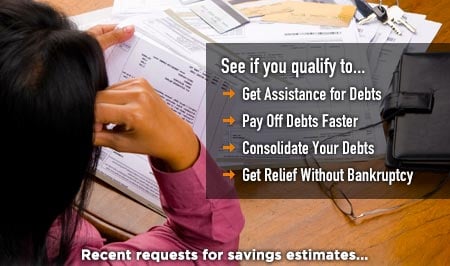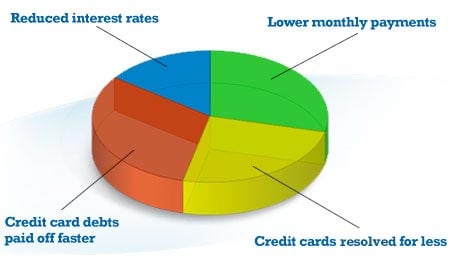
Debt Consolidation
Many residents of Tennessee as well as in other states who struggle with credit card debts want solutions and look to debt consolidation as one because credit cards provide a relatively quick and easy way to purchase everything from clothing to new TVs, but spending can get out of hand if you are not careful. High interest rates and late fees can make it difficult to pay off an outstanding balance, and in many cases, it can feel as if you are falling further and further behind. But there is good news.
There are a variety of options when it comes to finding debt relief, including debt consolidation through credit counseling, debt settlement, and even bankruptcy. For those consumers carrying multiple credit card and unsecured debts, debt consolidation can be a viable way to get back on track financially. Debt consolidation combines multiple sources of debt - such as credit cards or unsecured debts like gas charges, retail store charges, or utilities - into one, more manageable payment made to a credit counseling agency. In contrast, debt settlement is an option that allows consumers to negotiate with creditors, with the goal of significantly reducing the amount of they owe.
Today, many consumers have made both debt consolidation and debt settlement popular alternatives to bankruptcy, which has a more damaging and longer lasting impact to one's credit. Find out your debt relief options and how much you can save by simply answering a few questions to get your free debt relief analysis and savings estimate. It only takes minutes - begin now.
How Debt Consolidation Works
Debt consolidation typically combines your various sources of debt including credit cards and unsecured debts into one, more structured, and more manageable monthly payment made to a credit counseling agency. Many people find a single payment easier to manage and that it helps pay down their debts at an accelerated pace. Whether it is to pay off utility bills, credit card payments, or medical bills, the consolidation of unsecured debts can generally create a more efficient means of balancing your finances.
The debt consolidation process may seem daunting, but fortunately, there are credit counselors that can help with the process and make sure you have the best options available. By examining a debtor's monthly income and level of debt and expenses, a credit counseling agency could provide a management plan based on an individual's unique situation. This provides a structured path out of debt that, if properly followed, can help reduce debts in an accelerated manner.
If you decide to enroll in a debt consolidation program, a credit counselor will work with you to review outstanding debts and help allocate reasonable monthly payments. A counselor can typically submit proposals to creditors on your behalf, requesting a reduction in interest rates or a waiver of late fees and penalties to reduce the overall amount that you owe. The goal of relief through debt consolidation is, with a more affordable and more manageable payment plan, you can, ideally, pay down your debts sooner than if you only continued to make the minimum payments at higher interest rates.
Debt Settlement Alternative
If you have the type of debt that qualifies for debt settlement or if you simply cannot afford to pay the full amount, settling your debts can typically allow you to negotiate with creditors for a reduced amount of what you originally owe. For many consumers, debt settlement or negotiation can offer an honest and legal way to pay back their debts without declaring bankruptcy.
Keep in mind, however, the potential risks involved: When you enroll in a debt settlement program, your credit score will typically decline because when you settle your debts, it usually involves "falling behind" on your payments in order to set aside funds that can be used to make a settlement offer (or what's also called a lump sum payment). In addition, as you fall behind in making payments, you can also face legal action for, essentially, defaulting on the terms of your credit card agreements. But, in spite of all these risks, debt settlement has become a popular alternative for many consumers who want to avoid declaring personal bankruptcy.
Explore Your Debt Relief Options
Each individual's debt situation is unique and sometimes, finding a reasonable way to eliminate your debt may seem like an insurmountable task - especially if you have lost your job or are simply not earning enough. It's helpful to note that aside from debt relief, if you are also experiencing other financial difficulties, the state of Tennessee offers many programs to help low-income residents with job training, get access to health care services, and other basic necessities. In addition, the state's Housing and Development Agency has programs to help residents with their housing and mortgage concerns including avoiding foreclosure.
The bottom line is, if you are ready to tackle your credit card and unsecured debts, take the next step and find out what debt relief can do for you and your family. For many consumers, a debt consolidation plan can provide not only a more affordable and more structured payment plan, but it may also provide long-term budgeting skills. If you want to find out your debt relief options, request a free debt relief analysis and savings estimate today. Start here.





















